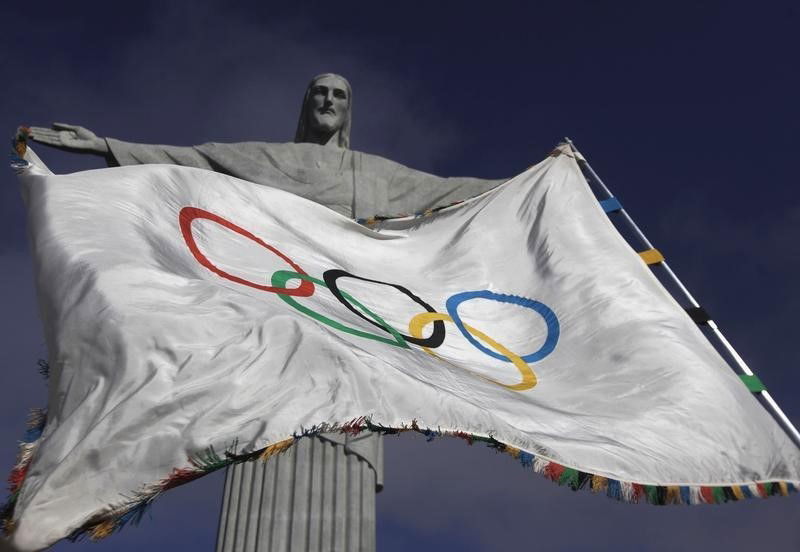
Reuters
The Olympic Flag flies in front of “Christ the Redeemer” statue during a blessing ceremony in Rio de Janeiro August 19, 2012. REUTERS/Ricardo Moraes/Files

Reuters
The Olympic Flag flies in front of “Christ the Redeemer” statue during a blessing ceremony in Rio de Janeiro August 19, 2012. REUTERS/Ricardo Moraes/Files
RIO DE JANEIRO (Reuters) – Temporary power supplier Aggreko has pulled out of a tender to provide generators to the Olympics in Rio de Janeiro next year, the spokesman for Rio 2016 told Reuters, dealing a major blow to organizers rushing to secure an energy source for the world’s largest sporting event.
Watch What’s Trending Now!
The temporary power contract is a vital part of Olympic preparations, guaranteeing a stable and secure energy supply for international broadcasters, the opening and closing ceremonies, as well as back-up electricity for the venues.
The most experienced bidder pulling out on such a crucial contract is a worrying sign for Olympic organizers who are under huge pressure to cut spending as Brazil languishes in its worst recession in 25 years. The government has already warned that there is no money to cover any cost overruns.
ADVERTISEMENT
Preparations for South America’s first Olympics have been dogged by concerns over the polluted bay where the sailing will be held as well as violence spilling over from heavily policed slums, or favelas. Officials say construction of venues and infrastructure remains on track, but recently admitted Brazil’s recession is making delivery more difficult.
Aggreko, which has been involved in nine Olympics and six World Cups, declined to comment because the result of the tender has not yet been announced. Sector analysts said not being awarded the contract could impact Aggreko’s 2016 earnings and shares in the company closed down 1.8 percent.
For London 2012, Aggreko’s power deal was worth nearly $60 million, although the Rio 2016 contract is expected to be less as it is smaller in scope.
ADVERTISEMENT
Rio 2016 spokesman Mario Andrada told Reuters he was comfortable with the companies still competing for the tender, the winner of which will be passed to the board for approval on Tuesday.
LACKING CAPACITY
ADVERTISEMENT
Two other sources with knowledge of the tender said the companies left in the running were a mix of Brazilian and international firms, but said it was unlikely any of them had the in-country capacity and Olympic experience to fully meet the needs of the contract. It is likely that whoever wins would have to lease generators from Aggreko, they said.
“There is increased risk of going somewhere who doesn’t have the experience. Are there people out there with enough equipment? Probably. But in terms of the operational side of things, Aggreko are pretty good at this,” said Will Kirkness, an analyst at Jefferies.
Heavy equipment maker Caterpillar is one international firm that industry insiders say could be in the running to provide the power equipment. Caterpillar did not immediately reply to a request for comment.
ADVERTISEMENT
It is unclear why Aggreko pulled its tender, but the sources said they thought the firm had tired of two-year-old negotiations, as well as constant changes in both the scope of the tender and who would be paying – the government or organizing committee.
Organizers are trying to find substantial savings, as much as 30 percent in some areas, as Rio 2016 scrimps to avoid going over its 7.4 billion reais ($1.9 billion) budget. But with inflation at 10 percent, the Brazilian currency weakening against the dollar and last-minute work always costing more, cuts are proving difficult.
Time is now tight, too. For London 2012, the winner of the power contract was announced 20 months before the games started. The Aug. 5 to Aug. 21 games in Rio are just eight months away.
ADVERTISEMENT
In 2012, Aggreko’s pre-tax profits surged 11 percent, helped by its London Olympic contract. Aggreko provided London 2012 with 550 generator sets, 1,500 kilometers of cable and 5,500 distribution panels across 39 venues.
By Stephen Eisenhammer
(Additional reporting by Li-mei Hoang in London; Editing by Nick Zieminski)
ADVERTISEMENT
ADVERTISEMENT
ADVERTISEMENT
ADVERTISEMENT

